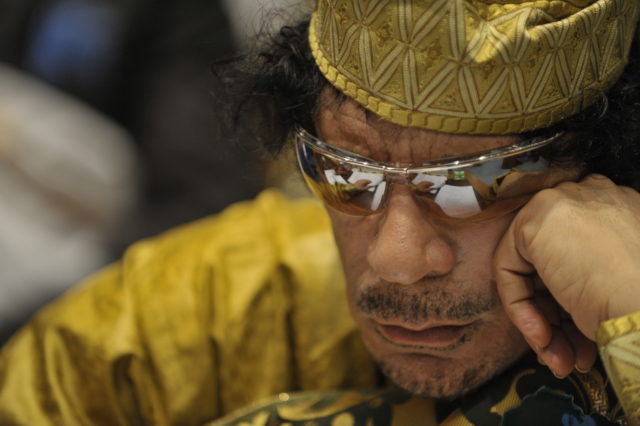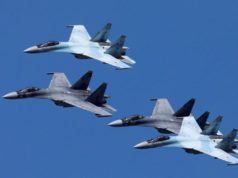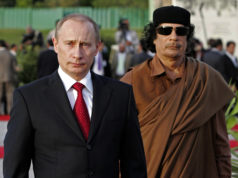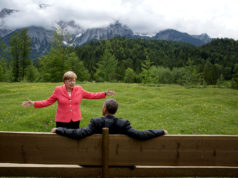Libya is a strategically important country, and in 2002 Moammar Qadaffi was angling to secure his role as leader of the African Union by portraying himself as the pivotal leader between Africa, the Middle East, and the West. I met his son Saif when I chaired the International Energy Advisory Council in 2003. Saif was the representative from Libya and it was he who invited me to lead a bi-partisan congressional delegation to Libya to discuss his father’s public commitment to renounce terrorism, give up his weapons of mass destruction and cooperate with the United States and President George W. Bush.
In 2004, as my six-member bipartisan congressional delegation walked into the most elaborate tent imaginable, I contemplated the words we would utter upon meeting Col. Qadaffi for the first time. As the first U.S. bipartisan delegation and first Americans to meet Qadaffi in over 20 years, we were invited to “tour” Qadaffi’s home that the U.S. had bombed in 1986 on orders of Ronald Reagan.
Qadaffi walked into the tent in a purple satin outfit carrying prayer beads in one hand. We extended courtesies and sat down. His first words were of thanks coupled with our need to explain why it took us 20 years to sit in his tent with him. “If you thought that I was a terrorist, why not come and tell me that to my face – and then bomb me if my answers were not satisfactory,” Qadaffi said. “But you bombed me first and killed my baby in the process.”
“None of us were in the Congress twenty years ago, Colonel. And we had to overcome objections in our own government just to be here today to thank you for your public statements renouncing terrorism and pledging to give up your program of WMD,” I said. “You need to know that Americans are a forgiving people, but we will never forget the Lockerbie bombing and the murder of two Americans in the La Belle nightclub for which your country has admitted involvement.”
I told Qadaffi we were not meeting with him to debate U.S. foreign policy – in our system, foreign policy is the prerogative of the president or secretary of state. But we made the stop to tell him personally that members of Congress (Democrats and Republicans) supported our president in his praise for Qadaffi’s words and that we were prepared to support President Bush in normalizing relations if and when it was verified that Qadaffi had actually delivered on his promise.
We reiterated our interest in avoiding more bloodshed, but also in stopping terrorism and controlling and eliminating WMD originating in Libya and worldwide. We talked for almost two hours. Qadaffi’s most striking comment was his biggest concern. He said, “In the end I realized that we have no need for WMD and that terrorism needs to be controlled throughout the world – so I announced to the world that Libya would take the lead on both matters. Libya will also cease its actions and hostility against Israel. But what worries me most is that your nation will ultimately embarrass me and my people. My friends in the region quietly tell me that I am making a mistake and that I will regret my decision because your leaders cannot be trusted.”
We assured Qadaffi that our colleagues in Washington and around the world hailed his leadership on these issues. In fact, in a brief private discussion, I challenged Qadaffi to contact Kim Jung Il in Pyongyang and ask him to follow the lead of Qadaffi. He said that he would and months later we found out that Qadaffi did make that call.
Qadaffi’s one request was that I return with a second delegation and, on the occasion of the Great Jamahiriya (Libya’s version of the State of the Union Address), that I speak to the entire country. After a brief discussion with my colleagues, I told Qadaffi that we would return and I would speak, but only if our President verified that Qadaffi’s commitments were being fulfilled. I also told Qadaffi that my plan was to invite a member of the Senate to join us. “I will ask my friend Joe Biden,” I said, “to join our delegation.”
In spite of the admonition of the Bush administration (as Joe explained to my delegation in the Tripoli Airport) Biden joined us on that historic second trip. I spoke to the Jamahiriya on the first day, broadcast live nationwide, and Joe spoke on the second day, challenging the Libyan people to accept the announcement of Qadaffi regarding his commitment to rejoin the family of nations. Our speeches were carefully consistent with the message of our government and Secretary of State Colin Powell acknowledged such in my de-brief upon return to the United States.
Our goal was simple and straightforward, as it had always been – “Support the President” – and engage with the people and institutions of Libya. We laid out an aggressive agenda of interaction with Libya and its people – assisting in converting the al-Rabta biochemical plant into a pharmaceutical factory producing anti-AIDS medications for all of Africa, encouraging American companies to work with Libya on infrastructure and humanitarian projects. A major international conference in Tripoli in 2005 was organized through the Oceans Security Initiative I had created. It was attended by 200 delegates from all of the Mediterranean countries, the United States and Russia. A blueprint was developed for environmental, economic, trade and maritime security against pirates and terrorism.
In the ensuing months Libya and Qadaffi responded by eliminating WMD (actually shipping equipment to the United States for disposal), renouncing terrorism and cooperating with the United States and international entities and earmarking massive infrastructure projects for companies around the world.
Each of my next four trips to Libya were more impressive – a trip to the Al Rabta Plant where Italian production machines had been installed to produce the AIDS medications, a trip to the Port of Misrata to witness growth of an international Free Trade Zone in a port being constructed using the Dubai model, visits to medical centers to witness collaboration with international medical centers in Europe and the Unted States, and trips to al-Fahta University where I addressed students.
Sidetracked
My colleagues and I had pushed for bold actions to build relationships in Libya with institutions and organizations worldwide to assist in developing a new generation of young Libyan leaders – not part of the Qadaffi family. In some cases that did occur – but more often than not, profits for foreign nationals exceeded commitments to internal reform and leadership development.
At a dinner with my associate Dr. Ahmed Gadi, dean of civil engineering at a-Fateh University and his wife at the al-Mahary Hotel (which had been built by the Turks), I said, “You must be very happy for your students.”
“What do you mean?” Ahmed retorted.
“Well, I am certain that your engineering students are being used as interns by the U.S. firm in the massive contract to rebuild your nation” I said.
“Well no, Congressman, I have had no contact with that U.S. firm for my department or for my students,” Ahmed replied.
I immediately reached out to the firm and they were quick to ask me how to reach Dr. Gadi. They should have needed no prodding.
Dr. Shukri Ghanem, whom I had met when he served as prime minister, as well as head of the Libyan National Oil Company, on more than one occasion complained to me that American and European leaders were cutting deals through Qadaffi’s children and relatives for allocations of oil and special deals. At Shukri’s request, I went to Vienna to meet with him after he left Libya during the war. He told he feared for his life because of all the private deals that had been done through former officials that might cause concerns abroad once they were made public.
I met with Shukri at his daughter’s home in Vienna and cautioned him regarding his personal safety. Asked if he sought asylum in the United Sates or Europe, he replied, “No Congressman, I want to return to my Libya to help lead our people.” Within weeks Shukri was found floating in the Danube River, dead from an “accidental” fall. Unconfirmed reports surfaced that his hands were tied.
Well-connected individuals and groups were focused on securing tranches of investment dollars from the Libyan Investment Authority (LIA) instead of on implementing programs to employ Libya’s youth. Instead of the stability of Libya, its institutions and its youth, the focus was on profit generation while reinforcing the family’s control.
The End of the Beginning
Remarkably, in January 2011 the British conducted an arms show in Libya pitching British military systems. Yet, in February 2011, they joined France, the United States and NATO in invading and de-stabilizing Qadaffi and the country.
During the war, I arranged a call at the request of a senior member of Congress on the Foreign Affairs Committee with Saif Qadaffi and heard Saif explain to my former colleague, “I was in the room with my father and [former French President Nicolas] Sarkozy when Sarkozy told my father if he gave control of Libya’s oil to France the war would end.”
Granted, Qadaffi was an imperfect leader – but he had upheld his commitments to the United States regarding terrorism and WMD.
The attack on Libya has now been considered to be one of the worst mistakes ever made by the West. Disagreeing with the decision to go to war, I was concerned with the loss of life and chaos in Libya, but also concerned that U.S. troops might be put at risk.
And so in February 2011 after the war broke out, I prepared an Op-Ed for The New York Times telling Qadaffi to “step aside.” I was contacted by a Bush confidant friend of Saidi Qadaffi, who had seen a draft. “Saidi showed it to his father,” my friend said. “Qadaffi is ready to leave and asks if you will come to Tripoli to meet him because he trusts you.”
Remembering Qadaffi’s admonition to me in our first meeting, I thought I should make the trip and sit face-to-face in the tent and tell him to leave, even though I had opposed the invasion. I requested and received calls from Saidi and Qadaffi’s Chief of Staff Bashir Saleh, with whom I had become friends. Both called and begged to me to come to meet the leader – I requested an invitation letter from Bashir addressed to me and he sent my exact draft language back to me with his signature affixed.
I asked the U.S. friend of Saidi to pay for my airfare and he offered Frequent Flyer miles – I desired no remuneration. I also asked him to join me along with the son of one of Hillary Clinton’s friend sand one of Joe Biden’s former staffers. To be protected from the games that are frequently played, I also brought along a TV anchor and cameraman to document everything.
After the dates were set, I briefed U.S. government agencies and told The New York Times that my op-ed was not to be published until I was already in Libya – which it agreed to do.
We flew to Tunis and then to Remada where we were met by a Libyan caravan that had crossed into Tunisia. For four hours, we drove down the coast, through the small cities and villages, past the refinery complexes and amidst the fighting – until we reached Tripoli and our hotel. There was no evidence of a humanitarian disaster “about to occur,” as U.S. officials had claimed.
Within hours Saidi and Bashir arrived separately at our hotel, which had been bombed and only opened for us. We met Saidi and Bashir and they told me that Qadaffi was ready to “step aside.” The meeting with Qadaffi was set for the next day – that is until Saif Qadaffi (listening to his intel advisor Abdullah Senussi) convinced his father to cancel the meeting. Saif was convinced that if I met with his father and convinced Qadaffi to act on his desire to leave, Saif would never follow in his father’s footsteps as Libya’s leader.
I was outraged, angry and threatened to hold a press conference at the Rixos Hotel where the media was housed. Bashir and Saidi (and my American colleagues) convinced me to meet instead with Libyan Prime Minster Bagdadi Mahmoudi. With TV camera audio on (no photos were allowed) we met with the prime minister. I explained that I was not there in an official capacity and was not there to debate the war – I was there to tell Qadaffi to leave.
Mahmoudi explained that Qadaffi was prepared to step aside but wanted to do so with dignity. I requested a sealed letter from Qadaffi be prepared, signed and delivered to me, which I would deliver to our State Department.
The next day our TV crew filmed the delivery of the sealed letter, which I carried with me until I delivered it to our Embassy staff in Tunisia. Qadaffi’s letter was delivered to the Secretary of State – but to this day – has never been released to the public.
Make no mistake – Qadaffi was ready to leave – and if the West had allowed him to leave, tens of thousands of lives would have been saved, elections would have been held, Libya would have remained stable and terrorist groups including ISIS would not have flourished and used Libya as their base of operation.
As an eight-time traveler to Libya who has not taken one dime from Libya, I saw no evidence of an impending humanitarian crisis before the war and, Qadaffi had done everything requested of him by the United States and NATO allies. Further, a realistic assessment of what might occur in Libya post-Qadaffi with radical Islamist terrorists was woefully lacking, and the West had not taken necessary steps to help build and nourish a civil society and future leaders separate from the family.
Empowerment Strategy
Libya, battered by outside forces, including ISIS – a sad result of Western intervention in 2012 – is not ready for international assistance on a large scale, but it should not be written off. As ISIS is forced from its territorial base there, a well-conceived and well-led program could help bring the Libyan people the security they are sorely missing: physical, economic, health, education and the security to practice religious beliefs without outside interference and malicious manipulation. As a result, all of North Africa would become more stable and more prosperous.
Internal leadership is absolutely critical, but assessments and strategic planning will have to come from the international community. Working with Libyan leaders, American and other officials, using experienced gained, for example, from post-communist Russia, can assess outside assistance in key target areas and develop recommendations.
I strongly recommend a U.S. Congress/Libyan Parliament Working Group, modeled after similar relationships between Congress and the Japanese Diet, European Parliament, Russian Duma, Ukraine Rada, German Bundestag and others. A formal relationship can be developed between the Libyan Parliament and Congress. Parliamentary exchanges, staff exchanges, working sessions and IT based bilateral capital-to-capital communications could produce suggestions for enhanced bilateral relations, specific programs, workshops and conferences and task forces to focus on specific initiatives.
The United States has an opportunity to aid the Libyan people in their quest for independence, self-governance and dignity for every person. Will we be able to learn from our mistakes?
Curt Weldon served as a member of the U.S. House of Representatives from 1987 to 2007 for Pennsylvania’s 7th district and retired as chairman of the Armed Services and Homeland Security Committees.






